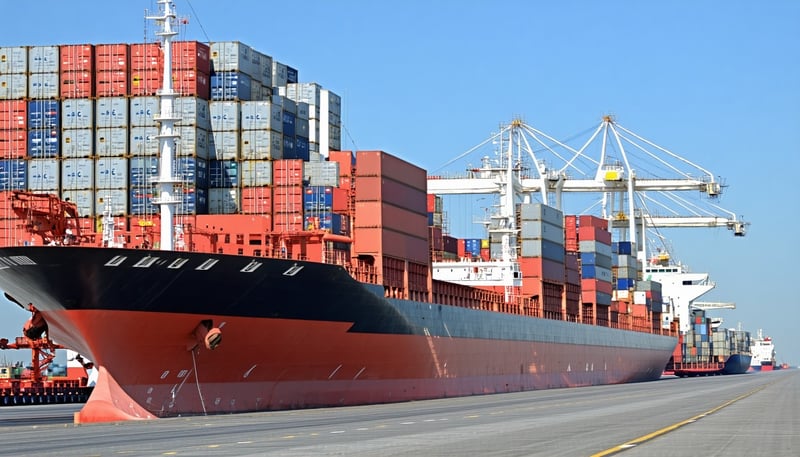The Latest Trends in International Transport and Container Evolution

March 17, 2025, 12:00 PM · 4-minute read
International transport is a rapidly evolving industry. As global trade continues to grow, companies face new logistical challenges. At the heart of these changes is the evolution of containers and the adoption of advanced technologies that are transforming the transportation process. In this article, we explore the current trends in international transport and the impact of smart containers.
1. Key Trends in International Transport in 2025
The international freight transport industry is influenced by several major trends that are changing the way goods are transported around the world. Among them, the digitalization of processes and automation of ports are key drivers of this evolution.
A. Digitalization of Transport and Cargo Tracking
Digitalization in international transport makes real-time cargo tracking more efficient, a crucial factor for ensuring safe and timely deliveries. Internet of Things (IoT) and Transportation Management Systems (TMS) allow businesses to monitor every step of the shipment journey, enhancing transparency and stock management.
B. Automation in Ports and Logistics Processes
Automated ports help reduce loading and unloading times for containers, optimizing transit times. Automated ports are designed to reduce congestion and improve efficiency, lowering costs for businesses and providing a better experience for customers.
C. The Importance of New Maritime Routes
New maritime routes, such as those via the Suez Canal, are helping to shorten transit times between Asia and Europe, enabling faster transportation of goods. These new routes reduce maritime freight costs and help avoid congestion in traditional shipping lanes.
2. Containers: The Key Element in International Transport
Containers are a vital component of international freight transport. Their design, durability, and technological evolution play a significant role in ensuring smooth logistics operations.
A. The Evolution of Containers: From Durability to Intelligence
Modern containers are built to be more durable and resilient. Materials like stainless steel and corrosion-resistant alloys are used to extend the lifespan of containers. Moreover, the integration of smart technologies allows businesses to track and manage their shipments more precisely, with IoT sensors monitoring temperature, humidity, and even the position of containers in real-time.
B. Refrigerated Containers: Meeting the Growing Demand
The demand for transporting perishable goods, such as food and pharmaceuticals, has driven the need for specialized transportation solutions. Refrigerated containers are essential to ensure the safety of these goods during international transport. The use of IoT technology in these containers allows continuous monitoring of transport conditions, significantly reducing the risk of spoilage.
3. The Environmental Impact of International Transport
The transport sector is responsible for a significant portion of global CO2 emissions. However, efforts are being made to make international transport more sustainable and reduce its ecological footprint.
A. Initiatives to Reduce Carbon Emissions
The maritime industry is increasingly adopting eco-friendly practices, including the use of low-emission ships and alternative fuels like liquefied natural gas (LNG). These measures aim to reduce greenhouse gas emissions and make transport more environmentally responsible.
B. Optimizing Transport Routes to Lower Carbon Impact
The sector is also investing in technologies that help optimize transport routes, reducing fuel consumption. The use of route management algorithms allows for the selection of the most efficient paths, thus lowering both costs and carbon emissions.
4. The Future of International Transport: Towards a Smarter and Greener System
International transport is undergoing a major transformation, and smart containers are at the heart of this revolution. From digitalization of processes to the integration of sustainable technologies, the industry is moving toward a future where speed, security, and sustainability are top priorities.
Advanced technologies today enable smoother, more transparent, and cost-effective logistics management. However, challenges remain, such as container shortages and adapting to global environmental demands.
Conclusion: A Revolution in Progress in International Transport
The international freight transport industry is more dynamic than ever. With the introduction of smart containers, eco-friendly technologies, and automated logistics solutions, the sector is preparing to meet the challenges of tomorrow. Businesses that embrace these trends will be better equipped to meet consumer demands and adapt to the ever-evolving global market.
Optimize your logistics chain with reliable and eco-friendly international transport solutions. Explore our multimodal transport and international relocation services for a tailor-made service that meets your specific needs.
Post by Brahim SALHI
-3.png?width=500&height=500&name=LOGO%20DEMENEX%20(500%20x%20500%20px)-3.png)